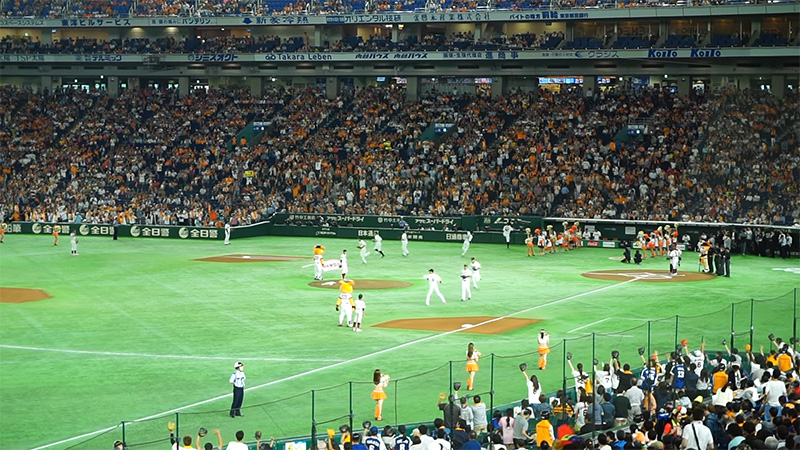Baseball is a sport deeply ingrained in Japanese culture and has gained immense popularity throughout the country. The passion for baseball in Japan is often compared to the fervor seen in the United States, with millions of fans flocking to stadiums, supporting their favorite teams, and closely following the sport.
This article explores the reasons behind the remarkable popularity of baseball in Japan, delving into its historical background, cultural factors, the differences between Japanese and American baseball, the Japanese Professional Baseball League, youth baseball and school competitions, and its significance as a source of national pride.
In this article, we’ll explore why baseball is so popular in Japan. So, stay with us till the end, to learn about it.
Why Is Baseball So Popular In Japan?
Baseball’s popularity in Japan can be attributed to several factors that have contributed to its widespread appeal. First and foremost, the historical background of baseball in Japan has played a significant role in shaping its popularity.
Additionally, cultural factors, such as the values associated with baseball, the fan culture, and the role of baseball in society, have further cemented its position as a beloved sport.
The differences between Japanese and American baseball have also piqued the interest of fans and provided a unique experience.
Furthermore, the Japanese Professional Baseball League, with its competitive teams and passionate supporters, has captivated audiences across the country.
Youth baseball and school competitions have also contributed to the sport’s popularity, nurturing young talents and fostering a love for the game from an early age.
.Lastly, baseball has become a source of national pride for Japan, with success on international stages evoking a sense of unity and celebration.
Historical Background of Baseball in Japan
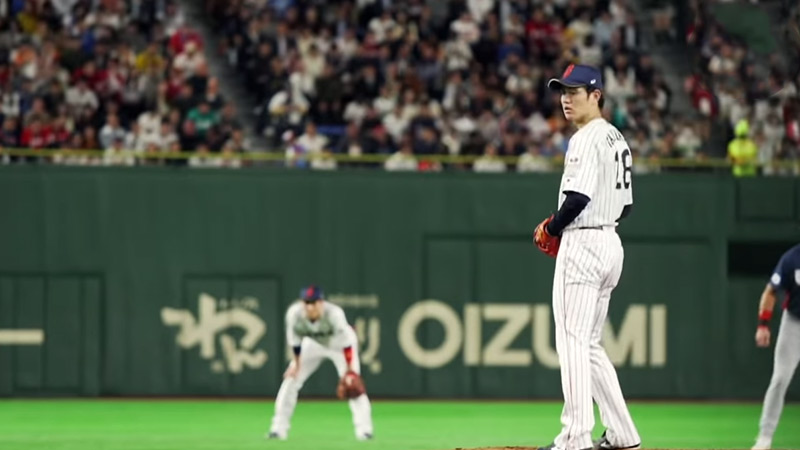
The origins of baseball in Japan can be traced back to the late 19th century when it was introduced by American teachers and students. The sport quickly gained traction, and its popularity grew during the Meiji era, as Japan embraced Western influences.
The establishment of baseball clubs, the formation of leagues, and the participation in international competitions contributed to the sport’s development and solidified its place in Japanese society.
Early Introduction of Baseball
Baseball was first introduced to Japan in the 1870s by American teachers and students who arrived in the country during the Meiji Restoration.
These foreign residents brought with them a love for the sport and started playing informal matches in their communities. The game quickly captured the curiosity of the Japanese people, who were intrigued by this novel sport from a foreign land.
Meiji Era and the Rise of Baseball
The Meiji Era (1868-1912) marked a period of rapid modernization and Westernization in Japan. As the country sought to catch up with the Western powers, it embraced various aspects of Western culture, including sports.
Baseball, with its team-oriented nature and strategic gameplay, appealed to the Japanese sensibilities and gained popularity among both the youth and adults.
Formation of Baseball Clubs and Leagues
In the early years, baseball was primarily played by foreigners and the Japanese elite, but soon it began to spread to wider segments of society.
The formation of baseball clubs became more organized, and local teams started emerging in cities and towns across the country. In 1878, the first baseball club in Japan, called the Shimbashi Athletic Club, was established in Tokyo.
The year 1896 marked a significant milestone in the history of Japanese baseball with the formation of the Tokyo Big6 Baseball League, which consisted of six prestigious universities in Tokyo.
This league played a crucial role in popularizing the sport among young Japanese students and laid the foundation for intercollegiate competition.
International Competitions and Baseball’s Growth
Japanese baseball teams started participating in international competitions, which further fueled the growth and popularity of the sport.
In 1905, the Waseda University team embarked on a tour to the United States and played against American college teams, showcasing the skills of Japanese players to an international audience.
One of the most pivotal moments in the history of Japanese baseball came in 1934 when the All-American baseball team, including legendary player Babe Ruth, visited Japan for a series of exhibition games.
This visit not only exposed Japanese players to the highest level of baseball but also garnered immense attention from the public, solidifying baseball’s status as a beloved sport in Japan.
Impact of World War II on Japanese Baseball
The outbreak of World War II had a profound impact on Japanese baseball. During the war, many professional baseball players were conscripted into the military, and the sport took a backseat as the nation focused on the war effort.
However, baseball continued to be played in internment camps, serving as a source of respite and a reminder of normalcy for the detainees.
Following Japan’s defeat in the war, baseball made a triumphant return and played a vital role in rebuilding the country.
.The post-war period saw the establishment of professional baseball leagues, which brought a new level of organization and competitiveness to the sport.
The enduring popularity of baseball in Japan can be attributed in part to the resilience and determination shown by players and fans during this challenging period.
Cultural Factors of Baseball in Japan
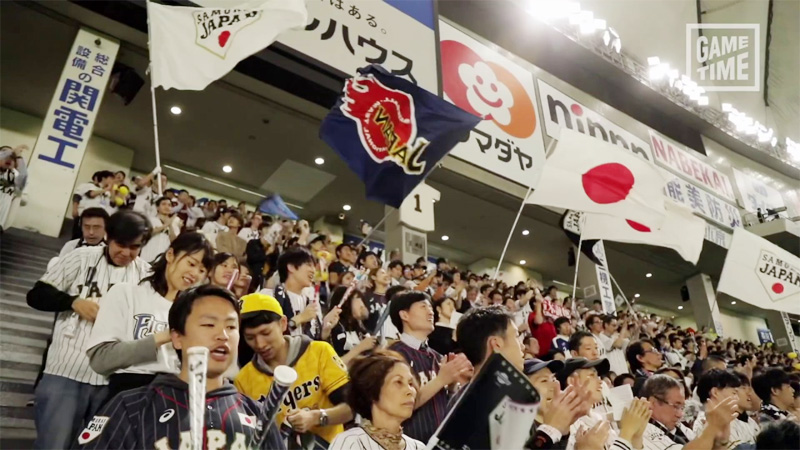
Baseball holds a special place in Japanese culture due to the values it embodies and the role it plays in society. The sport’s emphasis on teamwork, discipline, perseverance, and respect resonates deeply with Japanese values and has made it a symbol of national identity.
The fan culture surrounding baseball is also unique, with dedicated supporters known as “yakyū otaku” who passionately cheer for their teams, participate in chants and rituals, and demonstrate unwavering loyalty.
Cultural Values Associated with Baseball
Japanese culture places great emphasis on values such as teamwork, discipline, perseverance, and respect, all of which align closely with the core principles of baseball.
These values are deeply ingrained in Japanese society, and baseball serves as a powerful platform to showcase and reinforce them. The sport’s emphasis on teamwork promotes a collective mindset and the importance of cooperation over individual glory.
Players are expected to display discipline and adhere to strict training regimens, reflecting the Japanese concept of self-discipline and dedication.
Perseverance in the face of challenges and adversity is celebrated in baseball, aligning with the Japanese value of “geman,” which refers to enduring hardships with patience and fortitude.
Role of Baseball in Society
Baseball holds a unique place in Japanese society, transcending its status as a sport. It is often referred to as the “national pastime” and is celebrated as a symbol of national identity.
The sport’s popularity extends beyond the professional leagues, permeating various aspects of Japanese life. Baseball is frequently played in schoolyards, parks, and even in the streets, with children and adults alike engaging in friendly games.
The significance of baseball in society is reflected in the abundance of baseball-related cultural artifacts, such as movies, manga (Japanese comics), anime, and merchandise.
These cultural expressions not only entertain but also reinforce the emotional connection people have with the sport and serve as a means to transmit its legacy to future generations.
Fan Culture and Team Support
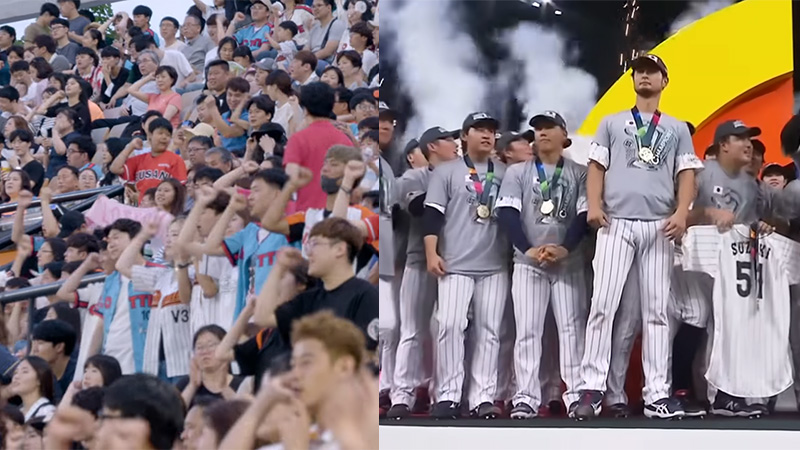
The fan culture surrounding baseball in Japan is unlike any other. Dedicated supporters, known as “yakyū otaku” or “baseball geeks,” demonstrate unwavering loyalty and passion for their teams.
Fans come together to cheer, sing, and chant in unison, creating a vibrant and electrifying atmosphere within stadiums. Each team has its own distinct cheers and rituals, and fans take great pride in maintaining these traditions.
Supporters often wear team merchandise, wave banners, and use inflatable noise-making sticks called “thundersticks” to amplify the excitement. The unity and camaraderie among fans contribute to the sense of belonging and community associated with baseball in Japan.
Baseball and Education in Japan
Baseball has a significant presence in the educational system of Japan. Many schools have their own baseball teams and participate in tournaments, fostering a competitive spirit and a sense of camaraderie among students.
The Kōshien Tournament, a prestigious high school baseball competition held annually, is regarded as a pinnacle of achievement for young players.
The tournament garners widespread attention from the media and fans, further fueling the passion for baseball among the younger generation.
Baseball is often seen as a means to instill discipline, teamwork, and a strong work ethic in students, preparing them for future challenges.
Baseball’s Influence on Popular Culture
Baseball’s impact extends beyond the field and into various forms of popular culture in Japan. It has served as a rich source of inspiration for movies, manga, anime, and literature.
Numerous iconic baseball-themed movies have been produced, portraying the sport as a metaphor for life’s struggles and triumphs.
Manga and anime series, such as “Touch” and “Major,” have captured the hearts of millions, showcasing the intense emotions and personal journeys of baseball players.
What Is the Difference Between Japanese and American Baseball?
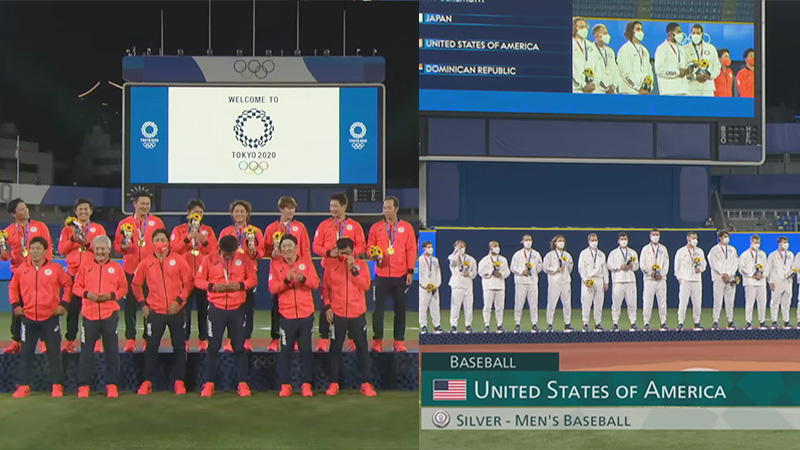
While baseball is a shared sport between Japan and the United States, there are notable differences that set Japanese baseball apart from its American counterpart.
These differences encompass various aspects, including the style of play, rules, team strategies, player development systems, and fan engagement.
Gameplay and Rules
- Field Dimensions: Japanese baseball fields are generally smaller than their American counterparts. Japanese stadiums tend to have shorter outfield distances, which can lead to more home runs.
- Tie Games: In Japanese baseball, regular-season games can end in a tie after 12 innings. In contrast, Major League Baseball (MLB) games do not end in ties; they continue until there is a winner.
Pitching Styles
- Pitching Technique: Japanese pitchers often rely on a wider variety of pitches and emphasize control and finesse. American pitchers may throw harder and focus more on power pitching.
- Starting Rotation: In Japan, it’s common for pitchers to have a more consistent routine, with five-man rotations and strict pitch counts to protect arms. MLB teams may use larger rotations and more bullpen pitchers.
Cultural Differences
- Fan Behavior: Japanese baseball fans are known for their enthusiasm and organized cheering sections.
The atmosphere at Japanese games can be very lively, with coordinated chants and songs. American fans also show passion, but the style of cheering can differ significantly. - Postgame Rituals: Japanese baseball players often engage in rituals like bowing to the fans and thanking them for their support after games. In American baseball, players typically exchange handshakes and high-fives.
- Fan Behavior: Japanese baseball fans are known for their enthusiasm and organized cheering sections.
Player Development and Scouting
- Youth Baseball: The development of baseball players in Japan often starts at a young age, with a strong emphasis on fundamentals and discipline in youth leagues. In the United States, there’s a more diverse and decentralized approach to player development.
- Scouting: MLB teams have a robust scouting system that extends internationally. Japanese baseball teams also scout talent globally but may have a stronger focus on domestic talent.
Season Length and Playoffs
- Regular Season: The Japanese Nippon Professional Baseball (NPB) regular season is shorter than the MLB season, typically consisting of around 140 games, whereas MLB teams play 162 games in the regular season.
- Playoffs: The playoff structure and format differ significantly. MLB has multiple rounds of playoffs, including the Division Series, League Championship Series, and the World Series. NPB uses a playoff format known as the Climax Series, which leads to the Japan Series.
The Japanese Professional Baseball League
The Japanese Professional Baseball League, also known as Nippon Professional Baseball (NPB), is the premier baseball league in Japan.
Established in 1950, the league comprises two divisions: the Central League and the Pacific League. Each division consists of six teams, bringing the total number of professional teams in the NPB to twelve.
The NPB is renowned for its competitive nature and high-level play. The league attracts some of the best baseball talent in Japan, as well as international players from countries such as the United States, South Korea, and Latin America.
The presence of foreign players adds a unique dynamic to the league, enhancing the level of competition and creating exciting matchups.
The NPB season typically runs from late March or early April to late October or early November, with each team playing 143 games.
The top three teams from each division advance to the Climax Series, a playoff tournament that determines the league champion.
The winners of the Central League and Pacific League then face off in the Japan Series, which is the ultimate championship series in Japanese professional baseball.
The league’s rich history, high-quality play, and exciting postseason tournaments have made it an integral part of the Japanese sports landscape, solidifying baseball’s place as one of the most popular sports in the country.
Youth Baseball and School Competitions in Japan
Youth baseball and school competitions in Japan form a crucial part of the country’s baseball culture and contribute significantly to the sport’s popularity.
From an early age, many Japanese children are introduced to baseball through organized youth programs, where they learn the fundamentals of the game and develop their skills.
These programs, often organized by local baseball clubs or schools, provide structured training, coaching, and opportunities for young players to compete against their peers.
One of the most prestigious and eagerly anticipated events in Japanese youth baseball is the Kōshien Tournament. Held annually at the historic Kōshien Stadium in Nishinomiya, this tournament features high school teams from across the country competing for the coveted title.
The Kōshien Tournament attracts widespread attention and garners massive television viewership, turning young athletes into local celebrities and inspiring future generations of players.
Youth baseball and school competitions in Japan serve as the foundation for the nation’s love affair with the sport. These programs provide young players with the necessary training, competition, and exposure to excel in baseball.
Baseball as a Source of National Pride for Japan
Baseball has emerged as a powerful source of national pride for Japan, evoking a deep sense of unity and celebration.
The success of the Japanese national baseball team, known as “Samurai Japan,” in prestigious international tournaments like the World Baseball Classic and the Olympic Games has been monumental.
These achievements have not only showcased Japan’s exceptional talent and passion for the sport but have also united the entire nation in support of their team.
The victories on the global stage have instilled a profound sense of pride among the Japanese people, reinforcing baseball’s significance as a symbol of national identity and garnering immense admiration for the players who represent their country.
FAQs
Has the Japanese national baseball team, Samurai Japan, won any major international tournaments?
Yes, Samurai Japan has achieved significant success in major international tournaments.
They have won the World Baseball Classic twice, in 2006 and 2009, and have consistently performed well in Olympic Baseball, capturing medals in several editions of the games.
How does the success of the Japanese national baseball team impact the country?
The success of the Japanese national baseball team generates a tremendous sense of national pride and unity. It brings the entire nation together, instilling a collective sense of joy and celebration.
The victories serve as a source of inspiration for aspiring players and reinforce the country’s reputation as a powerhouse in the sport.
Are there any iconic moments in Japanese baseball history that have contributed to its national pride?
Yes, there are several iconic moments in Japanese baseball history that have deeply impacted national pride. One such moment is the victory of the Seibu Lions in the 1992 Japan Series, ending a 10-year dominance by the Yomiuri Giants.
Additionally, the performance of Hideo Nomo, a Japanese pitcher, in Major League Baseball during the 1990s, garnered immense pride and admiration.
How does the success of Japanese players in Major League Baseball contribute to national pride?
The success of Japanese players in Major League Baseball brings a great deal of pride to Japan. When Japanese players excel in the world’s top baseball league, it showcases the country’s talent and demonstrates the high level of skill nurtured within Japanese baseball.
It serves as a testament to the nation’s ability to produce world-class players and reinforces its status as a baseball powerhouse.
Bottom Line
Baseball’s popularity in Japan can be attributed to its historical background, cultural factors, the differences between Japanese and American baseball, the Japanese Professional Baseball League, youth baseball and school competitions, and its role as a source of national pride.
The sport’s deep-rooted connection to Japanese values, the passion of its fans, and the success of Japanese teams on the international stage have made baseball an integral part of Japanese society and continue to captivate audiences across the country.
Hopefully, you understand the facts well. Thank you for your time.

